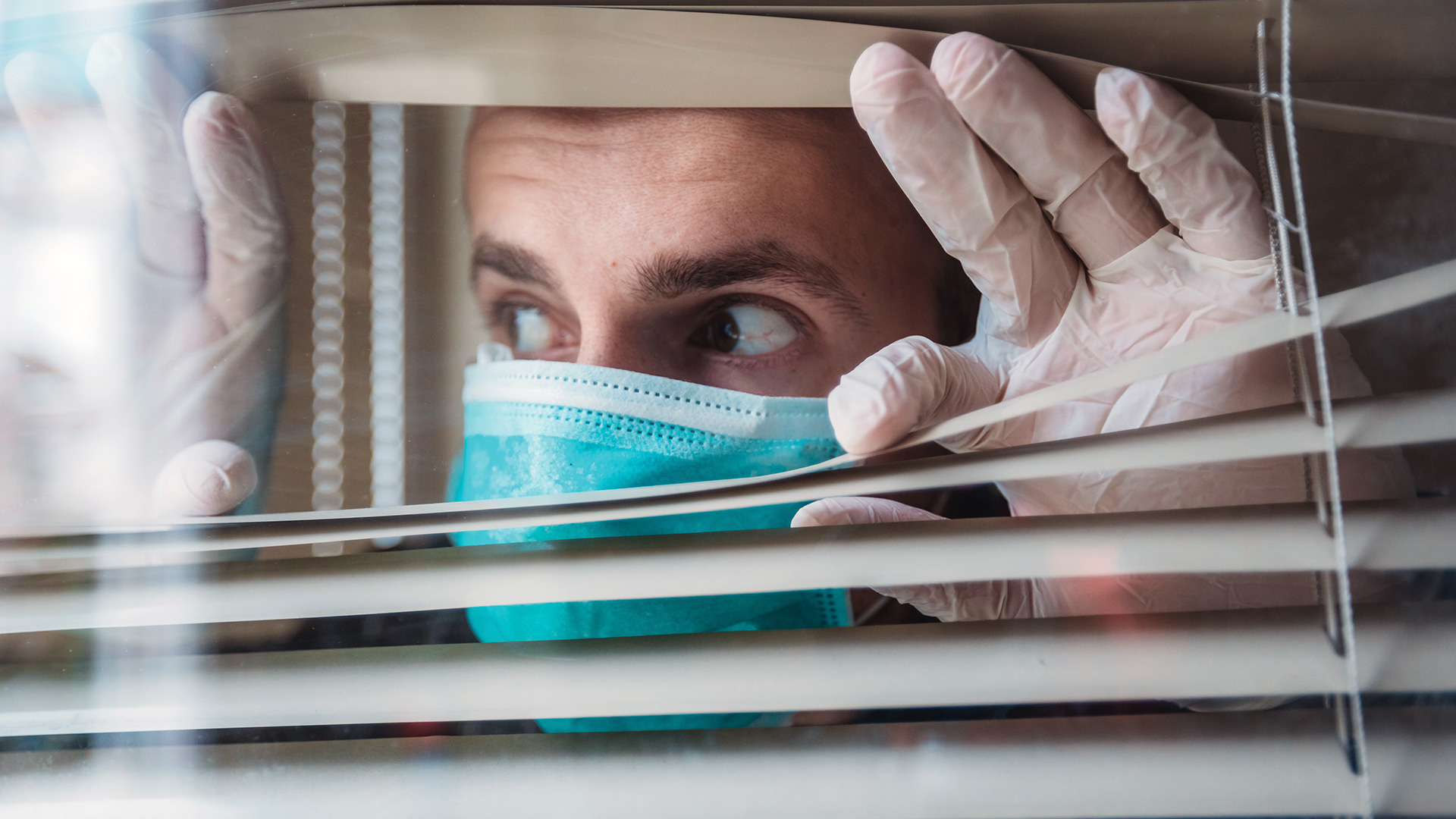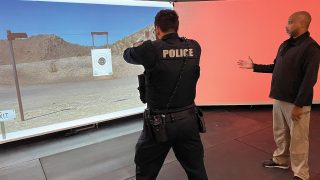
Every day law enforcement and corrections staff find themselves being bitten, stuck by a needle or searching persons who are potentially infected or covered with blood or body fluids. To reduce the risk that the next pat-down or handcuffing can pose, we’ll revisit the risks of impetigo, hepatitis B, MRSA, tuberculosis and HIV/AIDS.
According to the Centers for Disease Control and Prevention (CDC) and the International Association of Chiefs of Police (IACP), a communicable disease is defined as “an illness caused by an infectious agent or its toxins that occurs through the direct or indirect transmission of the infectious agent or its products from an infected individual or via an animal, vector, or the inanimate environment to a susceptible animal or human host.”
Law enforcement personnel are often overlooked at being an “at-risk” population. Officers share close contact with people, especially during a pat-down of a suspect, arrests, handcuffing, body searches, searching a purse or a car and during transports.
Law enforcement personnel are often overlooked at being an “at-risk” population.
There is a staggering list of communicable diseases to be aware of. We’ll focus on a handful that put officers at risk and conclude with prevention and hygiene.
Impetigo is a common and highly contagious skin infection. The face, arms and legs are most often affected. There are more than 3 million cases of impetigo in the United States every year. By far, this is the most prevalent of risks to officers and correctional staff who meet unhealthy and dirty clientele.
You can catch these bacteria if you touch the sores of a person with impetigo or you touch items like towels, clothes or sheets that the person used. This is a daily concern for correctional staff.
Hepatitis is an inflammation of the liver. Hepatitis B (HBV) is the most common risk in policing and can be transmitted through infected bodily fluids such as blood, semen or saliva. Needle sticks — which are the greatest risk to officers — could transmit the disease. HBV symptoms may include jaundice (yellowing of skin and eyes), vomiting, fever and generally feeling weak. The infection can result in liver failure, liver damage and liver cancer if left untreated.
Over 200,000 new hepatitis cases are reported each year. HBV is a hearty virus that can live outside of the body for up to seven days.
Unvaccinated officers are at a higher risk of contracting HBV than the general population. However, an officer who has received the HBV vaccine has 98% to 100% immunity for up to 30 years, according to the World Health Organization (WHO).
MRSA is a type of bacteria that aggressively destroys skin tissue. MRSA has also been labeled “the flesh-eating disease.” MRSA is usually spread by contact with infected people or things that are carrying the bacteria. This includes contact with a contaminated wound or by sharing personal items, such as towels or razors, that have touched infected skin.
Non-intact skin, such as when there are abrasions or incisions, is often the site of an MRSA infection. Although many people carry MRSA bacteria in their nose, most do not develop serious MRSA infections.
Approximately two in every 100 people in the United States carry MRSA. Each year, 90,000 Americans suffer from invasive MRSA infection, and of those approximately 20,000 will die.
The most recent number of annual tuberculosis (TB) cases recorded by the CDC totaled 7,174 cases in the United States. TB usually attacks the lungs, but the bacteria can attack any part of the body such as the kidney, spine and brain. Not everyone infected with TB bacteria becomes sick. Symptoms can include a prolonged bad cough, chest pain and coughing up blood. TB is an example of an airborne disease where the bacteria can be put into the air through coughing, sneezing or speaking.
According to the CDC, TB is treatable and curable in most cases. Active TB can be completely cured if you take a course of antibiotics against TB for at least six months. Occasionally, the TB bacteria may be resistant to one or more of the usual antibiotics, so treatment can take longer.
Human immunodeficiency virus (HIV) is contracted from an infected person’s blood, semen, vaginal fluid, breast milk, saliva and body fluids. More than 1 million people in the United States are currently living with HIV/AIDS. Every year, nearly 40,000 new infections are diagnosed. One in 300 of HIV exposure incidents (needle stick or cut) results in transmission of the disease.
HIV is a fragile virus and is easily killed by hot water, soap, bleach and alcohol. The virus can only last outside the body if blood or body fluid remains liquid. HIV can survive between three and seven days in dried body fluid stains and at least 15 days in liquid blood kept at room temperature.
The CDC is predicting that the downward trend of infection could bottom out to be less than 1,000 new infections by 2030.
You can be infected with HIV for years, even indefinitely, without ever developing symptoms. Infected persons with or without symptoms may transmit the infection to others. Acquired immunodeficiency syndrome (AIDS) is the advanced stage of infection of HIV.
Minimizing the risk
According to the CDC, not every exposure guarantees actual sickness. You must have a disease source, there must be a way to enter the host (abrasion, skin break or needle stick) and the amount of the disease load must be sufficient to sustain an infection.
If blood or a body fluid has splashed onto skin or into the eyes, nose or mouth, wash the skin with soap and water or rinse the eyes, mouth or nose with tap water for 15 minutes.
If you have a needle stick or laceration, the first thing to do is to clean the wound with soap and water. Then apply direct pressure to stop the bleeding if needed.
Personal protection and disinfection
Maintaining good hand and body hygiene is always a first line of defense. All cuts, scrapes and wounds should be clean and covered until healed. Don’t share personal items such as towels and razors.
Your gear can also be soiled with infectious bodily fluids while placing someone under arrest, performing first aid or any number of challenges that occur during a shift. Always refer to the manufacturer’s guidance when cleaning your duty gear, but it is a good habit to wipe down your gear periodically. You should also pay attention to your shoes. Wipe down your shoes after they are soiled. Keeping your shoes clean or stored at work can prevent you from bringing infectious bodily fluids into your home.
Patrol glove maintenance
No leather glove can be completely disinfected against infectious pathogens, according to OSHA guidelines. First, follow the manufacturer’s cleaning instructions. In the event that contaminated organic materials such as leather gloves, your shoes, uniform, belt, other garments and porous accessories cannot be fully disinfected, they can be sprayed with an aerosol-type disinfectant and allowed to dry, and then repeat the process once or twice. The interior of gloves can also be disinfected by turning them inside out and treating them in the same manner.
Synthetic gloves, such as those made with neoprene, can be cleaned with lukewarm water and mild soap. The gloves can be turned inside out and cleaned before they are air-dried. A disinfectant such as liquid Lysol can be applied for everyday health concerns by adding it to the water during normal washing of nylon or synthetic equipment and uniform parts. No bleach should be used at any time.
Communicable diseases continue to impact officer safety, and while COVID-19 has received priority over the past two years, the risk of disease exposure continues to be an officer survival issue requiring vigilance on every shift.
As seen in the March 2022 issue of American Police Beat magazine.
Don’t miss out on another issue today! Click below:






